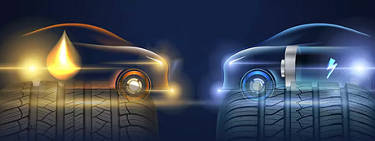Although they’re now a common sight on roadways across the nation, EV maintenance and care is not yet common knowledge. Our customers come to us asking what kind of tires their EV needs.
WHAT DOES EV COMPATIBLE TIRES MEAN?
Any tire that meets your electric vehicle’s speed, load, pressure, and size requirements is EV compatible. You do not need tires specifically designed for your EV.
Most people probably are referring to tires specifically designed for electric vehicles when asking about “EV compatible tires.”
We cover EVs and EV tires pretty thoroughly in our EV Tires vs Regular Tires blog.
A non-EV and an EV tire are largely the same in overall structure, shape, and function. EV specific tires do integrate features that address performance concerns, such as torque, weight, and efficiency
Our selection of the best EV tires is a great way to get your tire buying journey started.
DO EVs NEED SPECIAL TIRES?
No, EVs do not require special tires to function. You can equip your EV with a non-EV tire. However, you may want to strongly consider tires specifically designed for electric vehicles in order to get the most out of your ride.
There are several “EV” tires on the market.
| |
| |
|
Your original equipment tire is generally going to be the best option because it was specifically chosen to perform for your vehicle, especially if range is your primary concern.
Some tire manufacturers, such as Continental, don’t include EV specific badging or models in their lineup because their tires are automatically engineered to handle the robust demands of your electric ride.
Electric vehicle owners are primarily concerned with range and efficiency, but range isn’t necessarily guaranteed by purchasing EV specific tires. Many factors affect range regardless of tire type, including:
Rolling resistance (affects both gas and electric vehicles)
Tire wear (tread becomes easier to rotate with wear)
Weather/driving conditions
The outdoor temperature, whether hot or cold, affects not only your electric battery but also your tire pressure. Tire pressure affects fuel economy and range.
Do EV tires cost more?
Electric vehicle tires can cost a little more than regular tires.
They utilize specialized features tuned for electric vehicles like higher load ratings, noise-muffling foam lining, and high-torque tread.
Also, many electric vehicle tires are manufactured by premium tire brands such as Michelin, Continental, and Goodyear, so their pricing will naturally be higher than a budget brand.
Do EV tires wear out faster?
Not exactly. Any tire wears quickly when installed on an electric vehicle.
EV tires themselves do not wear out any faster than non-EV tires. An EV tire installed on a gas-powered vehicle would wear out just as fast as a non-EV specific tire model.
Tires on an EV wear faster due to the additional weight, nearly instant torque, and change of driving habits (some drivers act like they’re on a race track)! EV owners quickly become accustomed to the instant “go” of their vehicle so they tend to develop lead foot.
Let’s get you rolling
Tire buying can be a big decision, and even more challenging with an electric vehicle. Let us help! Use Treadwell, our smart tire buying guide, to quickly and easily help you choose the best tire for you, your vehicle, and your region.
START WITH TREADWELLTreadwell is the same tech we use in-store to help you find the best tires possible. Remember, you can save time in-store when you buy and book online!
For more information on this and other tire and wheel services, check out our YouTube Channel or reach out to us on X, Facebook and Instagram.
